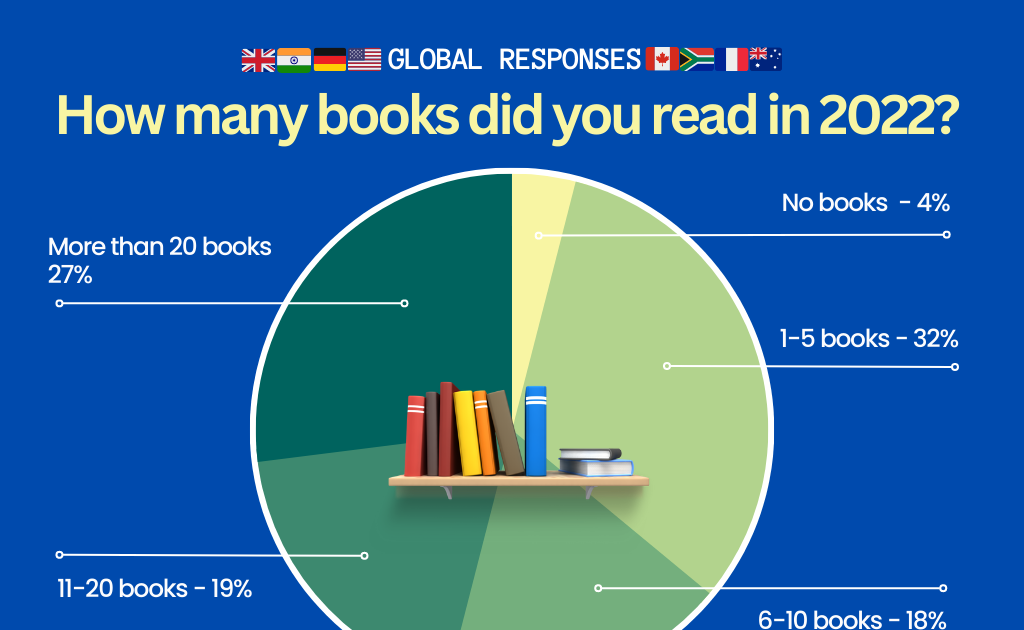What are the most popular books in the world? We asked 945 book readers in 56 countries what genre of books they are reading in 2022 and what they plan to read in 2023. Here are the global book reading statistics from the survey results.
We wanted to know what, how and how many people read. That’s why we asked 945 readers in 56 countries about their reading habits. Here’s what these book readers had to say.
Reading is alive and well. People around the world responded to our reading survey, sharing details of the books they read and how they read them. Here are some of the key findings from the global survey results.
Key findings from the book reading statistics
We have recorded the data. We captured the uncensored, anonymous comments. Here’s what we found.
Key Finding 1: Most people read a few books or many books.
We asked people how many books they’ll read in 2022. It turns out there are a lot of light readers, and quite a few dedicated bookworms, but far fewer moderately committed readers.
Survey says: According to the latest book reading statistics, 27% said they read more than 20 books in 2022, while 32% said they read one to five books. Only 18% said they would read six to 10 books in 2022, and 19% read 11 to 20 books.
Regionally, American and British readers tended to be heavy book consumers (39% and 44% respectively who read more than twenty books), while Canadians tended to be lighter readers (23% who read more than twenty books).
It’s worth noting that some people felt we were limiting demand too much by making “20+ books” the top category. “More than a hundred books,” noted one Canadian reader. “It seems very low to have 20+ as the highest category,” said a British reader.
If people read so many books, what are those books about? The answer can be found in Key Finding 3.
Key Finding 2: People plan to read more in 2023.
Predictions that the end of the books was near have proven premature. If books are one day forgotten, that day is not yet in the offing. In fact, the data shows that people plan to read even more in 2023 than in 2022.
The research shows: 64% of readers plan to read more books in 2023 than in 2022. Only 3% plan to read fewer books. These results are quite comparable across regions. A Kenyan reader summarized the atmosphere of the research: “I enjoyed all the reading this year. I look forward to reading more.”
Only a well-oiled crystal ball will tell whether people will ultimately read more in 2023 or simply have the ambition to do so. Yet the intention to read more shows that their love for books remains great.
Reading is alive and well. In the words of one Australian reader: “I just love reading, it’s my favorite pastime.”
If people plan to read more, what do they plan to read? The answer can be found in Key Finding 4.
Key Finding 3: The main books people like to read are history, mystery and biography.
We asked people about the books they read. We wanted to know whether they read fiction or non-fiction. And we wanted to know what genres their books were. Let’s see what the statistics show.
Survey says: According to the latest book reading statistics, the top three genres in the world in 2022 were:
- History (34%)
- Mystery (33%)
- Biography/memoir (31%)
We noted some small regional differences. Canadians were much less interested in history. Meanwhile, British readers showed a strong interest in fantasy.
Other widely read genres included fantasy, science fiction and self-help. Both other fiction and other non-fiction were selected by many readers (36% and 34% respectively), meaning we will need to add more categories next year. And many respondents came up with suggestions. Here are a few:
- “I like reading poetry books, maybe that should be a category.” (Kenyan reader)
- “Horror and cookbooks are not in it. I’ve read a lot of it.” (American reader)
- “I also read a lot of children’s books to my toddler.” (Canadian reader)
- “I also read a lot of spiritual things and poetry.” (American reader)
- “It’s not specifically on your list, but I read a lot of horror and multi-genre.” (American reader)
- “Normally I like to read more spiritual books with a lot of history and knowledge.” (Indian reader)
- “I read a lot of plays and fan fiction.” (Canadian reader)
- “I don’t read much modern fiction, no mysteries or romances. I strongly prefer poetry, non-fiction and older novels.” (American reader)
- “You don’t have a category for poetry or a category for short stories, so I had to lump both under ‘Other Fiction.’” (American Reader)
- “I mainly read non-genre fiction and philosophy.” (Canadian reader)
- “I also like to read freestyle poetry.” (Pakistani reader)
- “I’m an adult who reads a lot of horror and nonfiction, but I also still read graphic novels, picture books, and chapter books.” (American reader)
- “I mainly read paperback horror from the 20th century. there wasn’t a genre option for horror, but that’s what I focused on a lot. (American reader)
- “I read a lot of LGBTQAI books.” (Irish reader)
- “Love horror and true crime.” (American reader)
- “Philosophy!” (Canadian reader)
- “Popular Science and Literature.” (UK reader)
- “Social justice, education, psychology.” (American reader)
So it looks like we’ll be expanding the categories next year. At the very least, we will need to add horror, poetry, children’s books, philosophy, spirituality, and comics (such as manga and graphic novels).
Key Finding 4: Readers want to read more history, mystery, and biography.
When people say they plan to read more in 2023, it should come as no surprise that more people plan to read every genre in 2023 than in 2022.
Survey says: The top three genres people around the world want to read in 2023 are:
- History (39%)
- Mystery (35%)
- Biography/memoir (34%)
Other popular genres included fantasy, science fiction and adventure. Both other fiction and other non-fiction were selected by many readers (38% and 35% respectively).
In the graph below, the numbers and blue bars represent what people plan to read in 2023. They are overlaid on the yellow bars, which represent what people plan to read in 2022. You can see that in almost every genre, statistics show that people are aiming to read more than they will in 2023.
Once again we noted some regional differences among miners. Canadians were much less interested in history and much more interested in science fiction. Meanwhile, American readers want to read a lot more “other fiction.” This reinforces our need to add more categories next year, such as poetry, horror and comics/manga.
Key Finding 5: People still like paper books.
The demise of books has happened predicted – And doubtful – for more than a decade. Yet people still read them.
I wrote about the pros and cons of eBooks in 2017, where more pros than cons were mentioned. Yet I still read paper. Am I the only one? That’s not what the book reading statistics in our study say. We asked people to name the format they will read most in 2022.
Survey says: 57% of people read paper books (print books) most often – 41% paperback and 16% hardcover. 32% of readers chose eBooks – 20% Kindle and 12% other eBooks. Another 8% listened to audiobooks and 3% chose ‘other’ (including comic books, Brail or another format).
That’s a strong vote of confidence in paper around the world, but with some equally stark regional differences.
Americans are less interested in paper and slightly more interested in all other formats. Interestingly, 29% of American readers love their Kindles. Canadians show the exact opposite: 67% read mainly paper, including 53% paperbacks, and only 23% choose eBooks.
Key Finding 6: People like the length of their books.
Writers sometimes struggle with their manuscripts. Did I take in too much? Do I need more details? Will people find my book too short or too long?
Writers: just keep doing what you’re doing.
The research shows: according to the latest reading statistics, 86% of readers think their books are exactly the right length. 11% think they are too long in this age of short attention spans, but 3% of dedicated readers who can’t get enough think their books are too short.
Of course, not everyone agrees. An Italian reader said: “I like very long books, something I can really dive into.” But one American reader countered: ‘Books over 600 pages really slow you down. No end in sight.”
Key Finding 7: Readers come in all ages.
If you thought the continued popularity of books, and paper books in particular, was due to old-timers struggling to adapt to the new technology, this research suggests otherwise.
Survey says: There are about the same number of readers 25-34, 35-44, 45-54 and 55-64.
Key Finding 8: Women view themselves as readers more than men.
Who reads more, women or men?
The research shows: 56% of respondents were female, 42% were male and 1% identified as other. This gap was even more pronounced in the United States, where two-thirds of respondents were women. This is consistent with other research showing this girls and women around the world are reading more books.
Survey methodology and limitations
We surveyed 945 people about their reading behavior in December 2022 to collect reading data about books. Because this is an internet poll, no margin of error is assigned to the results. Results are not weighted by age, gender, location or any other factor.
This was not a random study. Respondents tended to identify themselves as “readers.” Most people who don’t read books or haven’t read books in a while declined to participate. When citing this research, it would be most accurate to refer to “world readers.”
The survey was distributed mainly via social media. The accounts used to reach people were mainly on Twitter and LinkedIn, but also on Facebook and some smaller networks. The bias of these accounts, based on the composition of their followers, tends towards:
- writers, authors and self-proclaimed book lovers
- bloggers and online marketers
- other artists (musicians, craftsmen, photographers, etc.)
The bias of these accounts, based on the composition of their followers, differs from:
- sports-themed accounts
- religion-oriented themes
- scientists and health care bills
- fashion-oriented accounts
- accounts with food and travel themes
In the global results there is a huge preference for English-speaking people, and therefore for English-dominant countries. Canada in particular is overrepresented due to its size. We do not consider the UK sample size to be large enough to be considered statistically definitive; it should only be consumed for ‘entertainment value’.
A BIG “Thank you!” to everyone who completed the 2022-2023 Reading Survey and shared their reading habits with us. You guys rock!
Permission is granted to republish the images on this page and quote the book’s reading statistics. Attribution is required and a link back is appreciated (and helpful to readers), but not required.
We leave the last word to a participant from Algeria: “I love books. Everyone should read a book.”
What Do Women Want from Men?
Seeking a fulfilling relationship? Discover the core values & hidden desires women want from men, with actionable tips to put…
Reading Challenges for 2024
“We read to know that we are not alone.”William Nicholson Reading may be an inherently solitary activity, but it is something…
Unveiling the Enigma: 1899 – A Mysterious Until the End
Television enthusiasts have recently found themselves captivated by the enigmatic allure of the series 1899, A Mysterious until the End….
A Review of “Silver in the Bone” by Alexandra Bracken
Silver in the Bone by Alexandra BrackenSeries: Silver in the Bone #1published on April 4, 2023, Through Random House LCC…
Audrey Covington Breaks the Rules – A Heartwarming Tale of Adventure and Self-Discovery
A charming middle-grade adventure awaits within the pages of Karina Evans’s delightful novel, “Audrey Covington Breaks the Rules.” This book,…
Reading Challenges 2024: Elevate Your Reading Experience
Welcome to the dawn of a new year, bibliophiles! As we embark on this literary journey together, the possibilities are…






